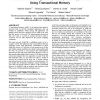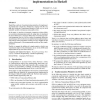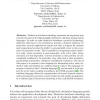156 search results - page 20 / 32 » An Abort-Aware Model of Transactional Programming |
ICS
2009
Tsinghua U.
14 years 2 months ago
2009
Tsinghua U.
“Is transactional memory useful?” is the question that cannot be answered until we provide substantial applications that can evaluate its capabilities. While existing TM appli...
POPL
2009
ACM
14 years 2 months ago
2009
ACM
Haskell has a rich set of synchronization primitives for implemented-state concurrency abstractions, ranging from the very high level (Software Transactional Memory) to the very l...
ACMICEC
2007
ACM
13 years 11 months ago
2007
ACM
Norms defined by institutions and enforced by organizations have been put forward as a mechanism to increase the efficiency and reliability of electronic transactions carried out ...
DAGSTUHL
1998
13 years 9 months ago
1998
Deductive database technology represents an important step towards the goal of developing highly-declarative database programming languages. In order to make deductive databases a ...
VLDB
2002
ACM
13 years 7 months ago
2002
ACM
A workflow consists of a collection of coordinated tasks designed to carry out a welldefined complex process, such as catalog ordering, trip planning, or a business process in an ...



